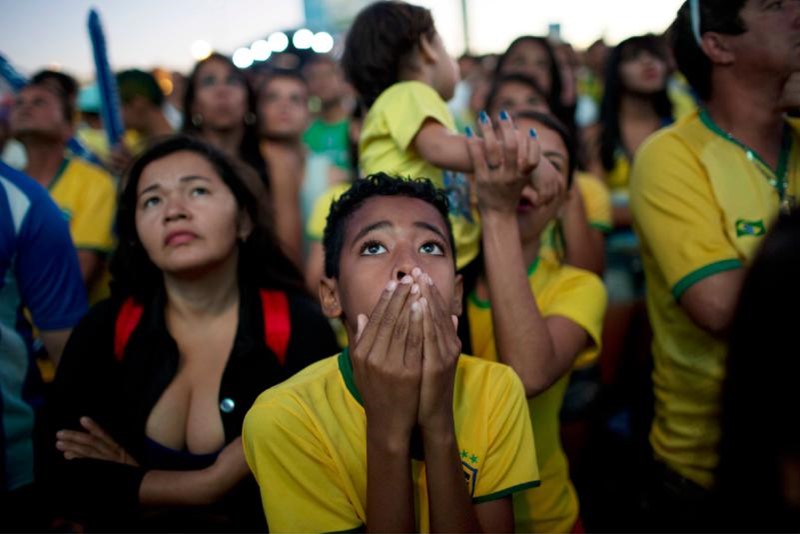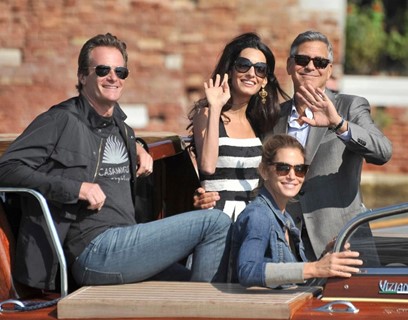
Fact: Brazil’s football team is not that good. What the team has are some good players and as long as they’re not overly tested they can endure. Unfortunately for them they were severely tested by Germany and minus both their captain and there chief goal scorer and poster boy, Neymar, they were found very wanting.
I’m glad that they were not eliminated early on in the contest because it would have made for a very bloody series since the host country has been experiencing some major civil strife of late and I didn’t want the news to be more about blood in the streets than football. Being awakened from a dream isn’t nice but the bread and circuses period is officially over now and so before they start to audit what exactly was the cost, I’d like to take some time to focus on why the majority of the faces we saw in the stadiums were mostly white. The simple answer is that the majority of Brazil’s black population (which is 60% by the way) is piss-poor. They live mostly in the favelas and are definitely invisible when it comes to the media. Needless to say, there is no political representation and not even the pretence of a black middleclass.
You would be hard put to find a Black Brazilian in either commercial bill boards or television. This nonexistence on television is especially interesting given the enormous popularity of soap opera, which is, after football, Brazil’s greatest obsession. Blacks are nowhere present. Interesting too is the fact that even when it comes to football you find far more dark skinned players on other South American teams than Brazil, a country known to have the largest concentration of blacks outside the African continent. Where are the other Pelés? As a matter of fact, why is it that you never hear Pelé himself mention that subject? He is definitely apolitical and this may be a clue as to why he has lasted so long in the minefield which is Brazilian society. It was Henry Kissinger by the way, who pulled certain strings to make certain that Pelé was able to get permission to leave Brazil and bring his soccer magic to New York City and the Cosmos. In a society rampant with racism he has pretty much achieved the status of honorary white. Neymar, for example, is very clear on the fact that he himself is not black, certainly not with that blonde dyed hair.
For some peculiar reason there is a very colourful myth which tries to present Brazil as a rainbow garden wherein everyone blends so well. The fact is that a favourite phrase in Brazil is: “Hey, you black monkey!” It is not unusual for a child to address a black school teacher that way, with impunity. Who suffer most are the recently arrived black professionals who have come to Brazil in search of the dream, having heard of Brazil’s booming economy only to encounter bitter disappointment. However, before we get totally carried away with the Brazilian situation we have to compare it with the rest of South America.
Note well that Argentina has no black faces running around on its team; it could be described as an Aryan nation (which made it a very handy hiding place for Nazis to hide after the war along with both Brazil and Uruguay). We need to remember that Argentina is famous for the Tango and that the Tango itself came from Africa. The most famous Tango dancers of the 1920s were all black. Question: what happened to the black population of Argentina? The answer is genocide, much like the systematic purging of the Dominican Republic under Trujillo. The first cowboys of Argentina (the Gauchos) who were black were systematically eliminated. There was a very conscious whitening-up process of importing Europeans to the country to save the race. Brazil did the same thing. However, the resistance and the sheer numbers were just too enormous. Besides, Brazil needed its blacks to work those coffee plantations and was in fact the very last to free its slaves (1888). One might argue that Brazil never really did quite free its black population; it merely imprisoned them in favelas. Human trafficking by means of sex has replaced whips and chains.
The truth is that the only thing available to blacks for escape in Brazil is Carnival and football. Both Carnival and football began as amusement for the white elite. Football came to Brazil in the 1890s by the English expatriate community. It was not long before it was absorbed and transformed by the black population because of the dance-like quality of its movement. It was however a long time before the game itself was integrated.
It was one thing to have blacks playing against each other for the amusement of white businessmen and quite another to have them play against whites. Sports, however, have always been a good distraction from revolution.
Now as to the other glorious distraction, Carnival, the entire year is spent in preparation for its celebration. Carnival is much more than costumes and pageantry. The entire structure of society is forgotten for one brief moment and the king (Momus) is raised high and the roles reversed. The favela is exchanged for the kingdom. From the mass emerges an individual. Suddenly you have a face and are what you fail to be for the rest of the year, a person, an identity. Given the brutality of Brazilian society it is easy to understand why the desire is so overwhelming to both lose and find yourself in the collective madness which is Carnival.
When we look at the everyday reality of the average Brazilian you begin to understand why soccer and Carnival are so important. In Brazil murder and violence is a constant. It is very easy to be disappeared if you’re poor and black and a nuisance. The police and military periodically have slum clearance campaigns which consist of early morning raids on the homeless. Children are especially vulnerable targets. The former president, Luiz Inácio Lula da Silva, (or Lula as he was popularly known) did much to stop the practice of “rat-hunting” which was what this sport was called whereby children were shot on sight. Bodies were seldom recovered from dumping grounds. It was Lula who introduced affirmative action in schools and universities whereby half of the openings must go to blacks. This was a major shift for Brazil in 2012.
The current president, Dilma Rousseff, on the other hand, believes that racism no longer exists in Brazil and that the street protests which Brazil has been experiencing lately has more to do with misinformation than design. She says the government really cares about all its people and of course, loves all equally. Reality however is about to reach not only the streets of Rio but the presidential palace as well. What maybe could be forgiven had Brazil won the world cup will certainly not be now, given the humiliating defeat. It was not just the loss; it was the manner of the loss. This is against a backdrop of an 11 billion dollar outlay which can’t possibly be excused given the fact that homes were raised to the ground to make car-park facilities for tourists, glaring expenditure that went way over budget.
Food, shelter and sanitation are the three things that this government is unable to deal with. Still the people searched to see themselves reflected in the arena and they didn’t. What they saw from outside the stadium where they were forced to stay and watch “the beautiful game” on giant screens, they didn’t like the version of themself they saw. It looked like defeat written large.
I predict that three things will happen now: Firstly, the collapse of the government. Secondly a search for another Pelé, which is to say the opening for a dark skinned superstar which thus far there has been no serious effort or attempt to find. And thirdly, a change also in the television media, which is to say a sudden appearance of a more representative face of Brazil. At present on television blacks don’t exist. If you don’t exist on television you don’t exist. This reality is about to change.
There is at present only one black Supreme Court judge, the first in history: Judge Joaquim Barbosa (he too was appointed by Lula while in office). He has a nasty habit of convicting corruption. I am sure he will have a few questions as to where exactly all that 11 billion dollars went and why. For the first time in a long time, Brazil will take a very long look at itself as a society. I think that it will improve the game because the society itself is the game. The football field is itself merely a mirror of all that is good and bad in the society. For example, of the 23 players available for the Brazil team, only 4 even play in Brazil. Everyone else plays in Europe or like Hulk, in Russia. The local teams don’t pay and so players are sold off in a new form of modern slavery to raise the coffers of local sides. In other words, born and raised for export, just like Brazil nuts. Is it any wonder then why the national team looks good on paper and yet is so weak in reality?
All of this is about to be dealt with for the first time, and why? Because it will be done under the glaring lens of the camera and the reason is that the world is not quite through watching Brazil. There is another little event about to take place in just two years: the Olympics which will also be hosted by Brazil. One can dance just so much Samba. And so reality will reach Rio too.
Note: Edgar Nkosi White is a Montserrat born playwright and novelist. His novel, the rising is available on Amazon.com
_x000D_

